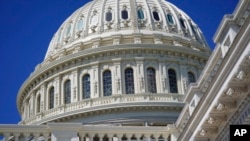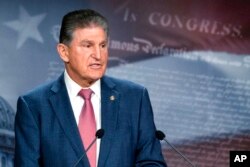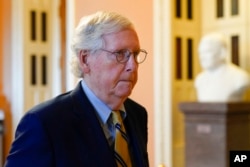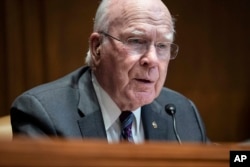Democratic lawmakers have unveiled a stopgap spending measure to finance the federal government through December 16, provide additional support to Ukraine and help communities respond to recent natural disasters.
Both chambers of Congress must approve legislation by Friday, which is the end of the fiscal year, to prevent a partial government shutdown. It represents the last bit of unfinished business for lawmakers before the midterm elections in November. Both sides are eager to wrap up and spend time on the campaign trail, lowering the risk of a federal stoppage.
The first test vote of the measure's popularity will take place Tuesday evening in the Senate, where 60 votes will be needed to proceed to a short-term spending measure. It's going to be hard to reach that threshold with lawmakers from both parties opposing provisions in the measure aimed at speeding up the permitting process for energy projects.
The bill provides about $12.3 billion in assistance related to Ukraine, including training, equipment, weapons, and direct financial support for the Ukraine government. The assistance would be on top of some $53 billion Congress has already approved through two previous bills.
The measure excludes the White House call for spending $22 billion to respond to COVID-19, and $3.9 billion to fight against an outbreak of the monkeypox virus. Republican lawmakers were overwhelmingly opposed to the health funding. At least 10 Republican senators would have to support the measure to overcome procedural hurdles and advance in that chamber.
The most contentious piece of the legislation is Senator Joe Manchin's plan to streamline the permitting process for energy projects and make it easier for a pipeline project in his home state and Virginia to proceed.
Manchin, a West Virginia Democrat who chairs the Senate Energy Committee, secured a commitment from President Joe Biden and Democratic leaders to have a vote on the permitting package in return for his support of a landmark law to curb climate change. Senate Majority Leader Chuck Schumer of New York made it clear he intended to include it in the must-pass continuing resolution.
While Republicans have voiced support for streamlining the permitting process for energy projects, some, including Republican Leader Mitch McConnell, are panning the effort.
"What our Democratic colleagues have produced is a phony fig leaf that would actually set back the cause of real permitting reform," McConnell said on the Senate floor Tuesday.
McConnell said he would vote against proceeding to the short-term spending bill if it included Manchin's legislation and encouraged others to vote no, too, a powerful signal to GOP lawmakers. Senator Richard Shelby, the ranking Republican on the Senate Appropriations Committee, also said he would vote against the continuing resolution if it’s included.
"We have made significant progress toward a Continuing Resolution that is as clean as possible. But, if the Democrats insist on including permitting reform, I will oppose it," Shelby said.
Top Democratic appropriators also said they were unhappy with the inclusion of Manchin's proposal, but said keeping the government running took priority.
"I am disappointed that unrelated permitting reform was attached to this bill. This is a controversial matter that should be debated on its own merits," said Senator Patrick Leahy, the Democratic chairman of the Senate Appropriations Committee. "However, with four days left in the fiscal year, we cannot risk a government shutdown; we must work to advance this bill."
The Mountain Valley Pipeline sought by Manchin would run through Virginia for about 100 miles. Manchin’s plan would expedite the pipeline and steer legal challenges to a different federal court. Democratic Senator Tim Kaine of Virginia said he opposes an expedited review for the pipeline and will vote against taking up the package, another sign that lawmakers won't have the 60 votes needed to move forward.
"We should pass a continuing resolution that is free of the unprecedented and dangerous" pipeline deal, Kaine said.
The disaster assistance in the bill includes $2.5 billion to help New Mexico communities recover from the Hermit’s Peak/Calf Canyon Fire, the largest wildfire in the state’s history; $2 billion for a block grant program that aids the economic recovery of communities impacted by recent disasters and $20 million for water and wastewater infrastructure improvements previously authorized for Jackson, Mississippi.
The bill would also provide an additional $1 billion for a program that helps low income households afford to heat their homes.
There has been wide, bipartisan support for boosting support for Ukraine. The bill includes $4.5 billion to help Ukraine's government provide basic citizen services and authorizes the president to drawdown $3.7 billion worth of equipment from U.S. stocks to support Ukraine's armed forces. There's also money to replenish U.S. stocks of equipment and munitions sent to Ukraine and to provide Ukraine with intelligence support and training.
"With Russia holding fake elections to annex parts of Ukraine, the Ukrainian people urgently need our support to continue protecting their families and defending global democracy," said Representative Rosa DeLauro, the Democratic chair of the House Appropriations Committee.







